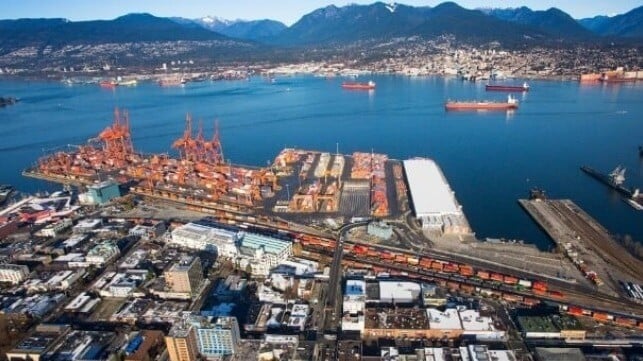Vessels Pile Up as Foreman Lockout Continues at Canada’s West Coast Ports

The strike/lockout of the foreman for the dockworkers union in Canada is continuing with reports that there are no new talks between the two sides. As it enters its third day, vessels have begun to pile up at Vancouver while business associations are increasingly calling for the federal government to intervene.
The BC Maritime Employers Association told The Canada Press that there has been no engagement with the local representing the foremen or federal mediators since the lockout began Monday afternoon. The employers continue to blame the local for calling a strike while saying the offer they presented is the same as what the longshore union accepted in July 2023. They also added provisions to address the foremen’s issues while saying it does not require any concessions of the union nor to waive the technological change notice provisions.
The association representing the employers has repeatedly called this its “final offer” in the contract negotiations that date back to March 2023. They however said without qualifying that the employers may be “required to reassess” their position on the current offer.
The strike is impacting all the container terminals including in Vancouver which accounts for 40 percent of the cargo movement in Canada. General cargo and some bulk are impacted but not grain or cruise ships.
Carriers appear to be taking a wait-and-see approach so far while the terminals remain closed. Containers ships, including CMA CGM Orfeo, HMM Peridot, MOL Premium, YM Plum, and Ever Steady, all are waiting outside Vancouver Island. Reports said two more were due to arrive during the day on Thursday. Several car carriers are also waiting off the terminal while in the Out Vancouver Harbor and elsewhere more than two dozen bulkers have piled up.
“The shutdown of West Coast ports endangers approximately C$800 million (US$577 million) in daily trade in goods. This represents around 25 percent of Canada’s daily merchandise trade and will affect businesses, workers, and consumers across the country,” wrote the Business Council of British Columbia. They acknowledged the complexities of labor negotiations while emphasizing the importance of an agreement and saying “However, those negotiations having failed, we now call upon the federal government to intervene to reach a swift settlement.”
Similarly, the BC Chamber of Commerce issued a statement saying it was “disappointed” by the inability of the two to negotiate a new contract. Like the Business Council, the Chamber is saying the federal government should be involved so that both sides can work diligently to find a resolution quickly.
“Our port infrastructure is too critical to the health and success of businesses and workers to have this dispute continue one moment longer. It will only serve to inflict further harm to our provincial and national economies and our international reputation as a reliable trading partner,” writes Fiona Famulak, President and CEO of the BC Chamber of Commerce.

that matters most
Get the latest maritime news delivered to your inbox daily.
Businesses note that the pressures are greater in this year’s strike because of the time of year. In July 2023, the longshore union was on strike for 13 days closing down the West Coast ports.
The government has convened an Industrial Inquiry Commission to explore the labor disputes at Canada’s West Coast ports. It is due to release its recommendations in the Spring of 2025.
